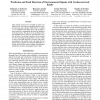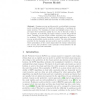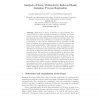133
click to vote
AAAI
2012
13 years 4 months ago
2012
Many signals of interest are corrupted by faults of an unknown type. We propose an approach that uses Gaussian processes and a general “fault bucket” to capture a priori uncha...
112
click to vote
IJON
2010
15 years 16 days ago
2010
We present an EM-algorithm for the problem of learning preferences with Gaussian processes in the context of multi-task learning. We validate our approach on an audiological data ...
130
click to vote
NIPS
2000
15 years 3 months ago
2000
We introduce the mixture of Gaussian processes (MGP) model which is useful for applications in which the optimal bandwidth of a map is input dependent. The MGP is derived from the...
105
click to vote
NIPS
2004
15 years 3 months ago
2004
Gaussian processes are usually parameterised in terms of their covariance functions. However, this makes it difficult to deal with multiple outputs, because ensuring that the cova...
119
Voted
ILP
2003
Springer
15 years 7 months ago
2003
Springer
RRL is a relational reinforcement learning system based on Q-learning in relational state-action spaces. It aims to enable agents to learn how to act in an environment that has no ...
117
click to vote
ESSMAC
2003
Springer
15 years 7 months ago
2003
Springer
Abstract. Gaussian process models provide a probabilistic non-parametric modelling approach for black-box identification of nonlinear dynamic systems. The Gaussian processes can h...
156
click to vote
ESSMAC
2003
Springer
15 years 7 months ago
2003
Springer
Abstract. While there is strong motivation for using Gaussian Processes (GPs) due to their excellent performance in regression and classification problems, their computational com...
140
click to vote
MCS
2005
Springer
15 years 7 months ago
2005
Springer
This paper describes a unified approach, based on Gaussian Processes, for achieving sensor fusion under the problematic conditions of missing channels and noisy labels. Under the ...
126
click to vote
IROS
2007
IEEE
15 years 8 months ago
2007
IEEE
Abstract— We propose to improve the locomotive performance of humanoid robots by using approximated biped stepping and walking dynamics with reinforcement learning (RL). Although...
121
click to vote
IROS
2008
IEEE
15 years 8 months ago
2008
IEEE
— High performance and compliant robot control requires accurate dynamics models which cannot be obtained analytically for sufficiently complex robot systems. In such cases, mac...



